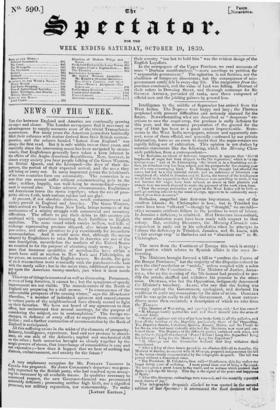— NEWS OF THE WEEK.
no ties between England and America are continually growing stranger and closer. The London newspapers find it necessary or advantageous to supply accounts even of the trivial Transatlantic occurrences. For many years the American journalists habitually filled their columns with matter derived from their British contem- poraries, and the column headed "Latest from England" was always the first read. But it is only within two or three years, and especially since the intervening ocean has been navigated by steam- vessels, that Englishmen generally have taken a keen interest in the affairs of the Anglo-American Republicans. Now, however, in almost every society you hear people talking of the Great Western, the British Queen, and the Liverpool—the days of their de- parture, the period of their expected arrival, and the news they will bring or carry out. In many important points the inhabitants
of the two countries form one community. The connexion is so near that one cannot suffer without communicating pain to the other; neither' happily, can well, doing be monopolized—enjoy- ment is mutual also. Under adverse circumstances, Englishmen and Americans brave the storm togetbier ; when the sun of pros-
perity shines finth, both nations rejoice and are glad. At present, if not absolute distress, much embarrassment and anxiety prevail in England and America. The Great Western, which arrived on Tuesday from New York, brings accounts of the continuance of a mighty struggle with commercial and monetary difficulties. The efforts to pay their debts to this country tire combined with operations incurring fresh liabilities to English capitalists. The same vessel which carries bullion, and bills of exchange representing produce shipped, also brings bonds and post-notes, and other promises to pAy exorbitantly for immediate accommodation. And it would scent that, although the means adopted by Englishmen to raise funds in America are not ot' the same description, nevertheless the markets of the United States are resorted to for the purpose of obtaining ready money. It ap- pears that immense quantities of merchandise have within a month been sold at auction in New York and Philadelphia, at low prices, on account of the English owners. Ni) doubt, the gain of such transactions rests eventually with the purchaser—the loss with the needy seller ; but in the mean time, additional pressure is pat upon the American money-market, just when it most needs
hiS state of things is unnatural as well as distressing. Permanent, or even of long duration, it cannot be ; but the symptoms of speedy improvement are not visible. The manufacturers of the North of England. are preparing for a dull season. "In consequence of the unfavourable prospects of the coming winter," says the Manchester Guardian, " a number of individual Spinners and manufacturers in various parts of the neighbourhood have already ceased to light up their factories. We have not heard of any agreement to that effect, but understand that several meetings, for the purpose of considering the 'subject, are in contemplation." The tbreign ex- changes, in defiance of every effort to support them, continue to decline; . and a further contraction of accommodation by the Bank of
tngland is anticipated. •
All this suffering exists in the midst of the elements of prosperity. Pidustry, intelligence, experience, land and raw produce in abund- ance', on one ;side of the Atlantic ; capital and mechanical skill Oa the other; both count•ries brought -so closely together by the inngic powers. of steam, that interchange of ceimmodities is easy and not expensive ;—how does it happen that we hear of nothing but distress, embarrassment, and anxiety for the future ?


























